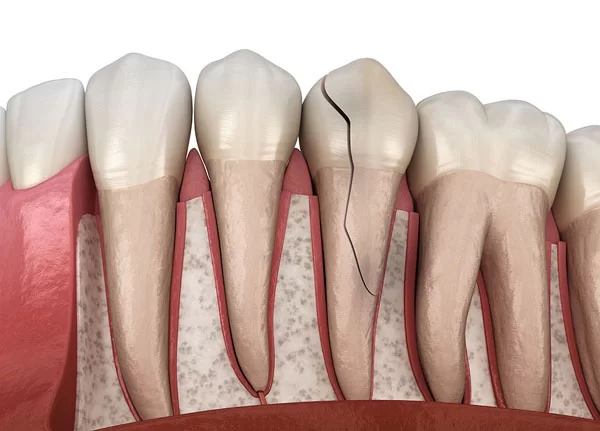Fix Your Smile After Accidents or Dental Trauma
At North East Dental Arts, Dr. Dina Nuhfer and our dental team understand that dental emergencies involving tooth fractures and cracks can be distressing. That’s why we’re dedicated to providing prompt and compassionate emergency dental services—whether by same-day appointments or walk-ins.
If you’re facing a sudden dental emergency due to a cracked or fractured tooth, we’re here to help restore your smile and relieve pain immediately. To learn more about our emergency dental services, contact our North East dental practice at (814) 725-4700.

Types of Tooth Fractures and Cracks
Craze Lines
Craze lines are superficial cracks that affect the outer enamel of the tooth. They’re typically harmless and don’t require immediate treatment. However, if they cause aesthetic concerns, dental bonding at North East Dental Arts can improve their appearance.
Fractured Cusp
A fractured cusp occurs when a part of the tooth’s chewing surface breaks off. This type of fracture usually doesn’t cause pain but may lead to discomfort during chewing. Our emergency dentist in North East, PA, can restore the tooth by placing a dental crown over it, ensuring your smile remains intact.
Cracked Tooth
A cracked tooth involves a more significant fracture that extends from the chewing surface toward the root. Cracked teeth can be painful, especially when chewing, and may cause sensitivity to temperature changes. Depending on the severity, a dental crown, root canal treatment, or extraction may be necessary. North East Dental Arts provides comprehensive solutions to address these issues promptly.
Split Tooth
A split tooth occurs when a tooth is vertically divided into separate segments. This type of fracture usually extends from the chewing surface to the root and can be painful. Saving a split tooth may not be possible, and extraction may be the only solution. Our team is here to guide you through the best treatment options available.
Vertical Root Fracture
A vertical root fracture starts in the tooth’s root and extends upward. This fracture isn’t visible to the naked eye and may cause intermittent pain when biting. Unfortunately, vertical root fractures often result in tooth extraction. North East Dental Arts ensure you receive the necessary care and discusses replacement options to maintain your oral health.

Causes of Tooth Fractures and Cracks
Understanding the causes of tooth fractures and cracks can help you take preventive measures to protect your teeth. Common factors include:
- Dental Trauma: Accidents, falls, or blows to the face can cause tooth fractures, especially in the front teeth.
- Biting on Hard Objects: Using teeth to open bottles, crack nuts, or chew on objects can lead to dental damage.
- Tooth Decay: Untreated tooth decay weakens the tooth structure, making it more susceptible to fractures.
- Bruxism (Teeth Grinding): Grinding or clenching your teeth, especially during sleep, can exert excessive pressure on the teeth.
- Uneven Bite: An uneven bite can cause certain teeth to bear more force, increasing the risk of fractures.
- Age and Wear: As we age, our teeth naturally weaken and become more prone to fractures and cracks
Emergency Treatments for Tooth Fractures and Cracks
At North East Dental Arts, Dr. Nuhfer and our team offer a range of emergency treatments to restore your dental health swiftly:
Dental Bonding
Dental bonding is a non-invasive and cost-effective treatment option for minor tooth fractures, including craze lines and small chips. During the procedure, our dentist applies a tooth-colored composite resin to the damaged area, carefully shaping and bonding it to the tooth.
Dental bonding restores the tooth’s appearance and reinforces its structure, providing strength and protection.
Dental Crown
A dental crown, also known as a cap, is a popular option for restoring a severely fractured tooth. If a substantial portion of the tooth is damaged, or if the crack extends into the root, a dental crown is often recommended.
The procedure involves placing a custom-made crown over the entire visible portion of the tooth, effectively restoring its shape, function, and appearance. We provide same-day crowns using our advanced Glidewell.io technology, ensuring minimal disruption to your day.
Root Canal Treatment
When a tooth fracture reaches the inner pulp of the tooth, it can cause excruciating pain and sensitivity. In such cases, a root canal treatment may be necessary to save the tooth from extraction.
During a root canal procedure, the infected or damaged pulp is removed, and the root canal system is thoroughly cleaned and sealed. Once root canal treatment is complete, a dental crown is often placed to protect and strengthen the treated tooth.
Tooth Extraction
In some situations, tooth fractures are so severe that the affected tooth can’t be saved. Tooth extraction becomes the last resort when the damage is extensive, the tooth can’t be effectively restored, or it poses a risk of infection to surrounding teeth.
After the extraction, our team will discuss tooth replacement options, such as dental implants, bridges, or dentures, to restore your smile and maintain oral function.

Preventive Measures to Avoid Tooth Fractures and Cracks
Prevention is essential for maintaining healthy teeth and avoiding dental emergencies. Dr. Nuhfer recommends the following:
- Wear a Mouthguard: Protect your teeth during sports or high-impact activities.
- Avoid Hard Items: Chewing on ice, or pens, or using teeth to open packages can lead to fractures.
- Maintain Oral Hygiene: Brushing, flossing, and regular check-ups strengthen teeth and reduce the risk of decay.
- Address Bruxism: If you grind or clench your teeth, we can provide custom mouthguards to protect your teeth.
- Correct Uneven Bite: Addressing bite issues with orthodontic care can prevent excessive pressure on certain teeth.
- Reduce Acidic Foods: Limiting acidic and sugary foods can prevent enamel erosion and tooth decay, keeping your teeth strong.
Frequently Asked Questions
Should I go to the ER for a cracked tooth?
Unless there’s severe pain, bleeding, or trauma affecting other areas of your face, it’s best to see an emergency dentist instead of visiting the emergency room (ER). Contact your emergency dentist’s office for a prompt, effective treatment.
Does a fractured tooth have to be pulled?
Not all fractured teeth need to be pulled. Depending on the damage, many fractured teeth can be saved with bonding, crowns, or root canal therapy. Tooth extraction is usually a last resort.
How urgent is fixing a broken tooth?
Fixing a broken tooth is relatively urgent, especially if the fracture has exposed the inner layers of the tooth, causing sensitivity and pain. Immediate treatment can prevent further damage and infection and alleviate discomfort. Ignoring a broken tooth may worsen the condition and may eventually lead to the loss of the tooth.
How long can you wait to fix a broken tooth?
If you have a minor chip, you may have some time. However, more serious fractures should be treated within a day or two to prevent infection and pain.
If immediate care isn’t possible, taking proper precautions, such as avoiding hard foods and maintaining good oral hygiene, can help prevent further damage until you can see a dentist.
Repair Your Broken Smile With Dr. Nuhfer
When it comes to emergency dental care, especially for fractures and cracks, timely intervention is key. At North East Dental Arts, Dr. Nuhfer and our dedicated team are here to help you with fast, compassionate care, whether you book ahead or walk in for a same-day emergency appointment.
We proudly serve patients in North East, Erie, Ripley, Findley Lake, and surrounding areas. Call us today at (814) 725-4700 to schedule your emergency visit and let us restore your smile.
 Pay My Bill
Pay My Bill